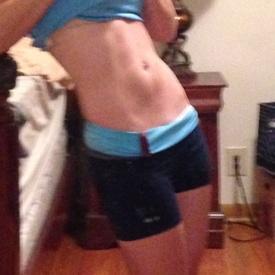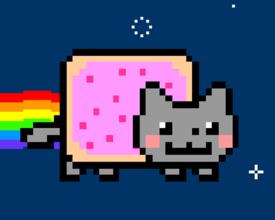Is late night workout as effective as a morning one?
Replies
-
I was just thinking about this last night. I usually work out while kids are napping around 11am, but schedules have been a little wonky, so I didn't get to do it yesterday. I ended up working out at 9:30pm and found I had a little less energy and balance than I normally do. I then had a salad and went to bed. I usually don't eat that late either, so the whole thing was kind of weird.
I can't work out on an empty stomach. I've usually had a small breakfast a couple of hours before my workout, but sometimes I have a little fruit, a handful of nuts, or a spoon of peanut butter before I start. Maybe this isn't the best idea, but I'm also nursing a 9 month old, so I need to listen when my body needs food or I get light headed.0 -
I've tried with NO success working out first thing in the AM. For one, I've found that I have to eat otherwise I'll pass out. Then working out immediately after eating, or in the space of time it takes me to get to the gym after eating causes me to regurgitate all that I've eaten and I'm sick again. Working out in the evening, strenuous cardio and weights, between 5 and 7 was the best time for me. Swimming even later, after dinner I can get my laps in around 8:30pm. Morning just wasn't a winner for me. I agree with what others said, time of day doesn't matter, time to participate and actually exercise is what matters most.0
-
That's not because of meal timing. It's because you are in a deficit. IF doesn't give you magical powers.Your workouts will be most effective if you do them on an empty stomach. The longer you've gone without eating, the more effective your workout will be. For most people, the longest they fast is while they're sleeping, so their morning workout is most effective.
This has been debunked over and over again.
Sort of. However, seemingly whenever it comes to diet and fitness, there are always multiple "correct" ways of doing things with professionals and experts on both sides saying the other point of view is a myth.
I've found that I can work out just as hard and often harder after a period of fasting than I can if I snack an hour before hand.
I hit my weight loss goal, continued following a traditional healthy diet and then decided to try intermittent fasting. I lost 10 more pounds, took 40 seconds off my mile time and increased my strict pull up max from 11 to 14. So it does work. It works for me, and it's worked for many other people.
Is it better than a traditional diet? I don't know for sure; But I think it is, and it definitely is for me. Don't knock it 'til you try it for a month.
I still eat 2200-2500 calories a day though, I just eat them all at once. I've been eating to maintain my weight, and I've been losing.0 -
The most effective workout is the one that you do, consistently. When you have unlimited time and no commitments other than exercise than you can start to worry about training timing. For all of us real people with lives, you just fit in training in the most convienient time, the one that you can get to.
Whenever you do work out, just work hard and be consistent and you'll get the results0 -
I always workout at night. Usually somewhere between the hours of 8 and 10PM. I wish I could be one of those people who get up and workout in the morning, but thus far I've been unsuccessful.0
-
Ok? That's nice. However, that still doesn't change what I said.
That's not because of meal timing. It's because you are in a deficit. IF doesn't give you magical powers.Your workouts will be most effective if you do them on an empty stomach. The longer you've gone without eating, the more effective your workout will be. For most people, the longest they fast is while they're sleeping, so their morning workout is most effective.
This has been debunked over and over again.
Sort of. However, seemingly whenever it comes to diet and fitness, there are always multiple "correct" ways of doing things with professionals and experts on both sides saying the other point of view is a myth.
I've found that I can work out just as hard and often harder after a period of fasting than I can if I snack an hour before hand.
I hit my weight loss goal, continued following a traditional healthy diet and then decided to try intermittent fasting. I lost 10 more pounds, took 40 seconds off my mile time and increased my strict pull up max from 11 to 14. So it does work. It works for me, and it's worked for many other people.
Is it better than a traditional diet? I don't know for sure; But I think it is, and it definitely is for me. Don't knock it 'til you try it for a month.
I still eat 2200-2500 calories a day though, I just eat them all at once. I've been eating to maintain my weight, and I've been losing.0 -
I have a theory that exercising late at night is better for fat burning due to HGH proteins. You produce HGH proteins during your sleep and when you exercise. So if you exercise and go straight to bed without a meal in between, then your HGH protein count should be extremely high. HGH proteins build muscles and burns fat. Eating lots of carbs will spike your insulin and stop hgh proteins from doing it's job.0
-
No.I have a theory that exercising late at night is better for fat burning due to HGH proteins. You produce HGH proteins during your sleep and when you exercise. So if you exercise and go straight to bed without a meal in between, then your HGH protein count should be extremely high. HGH proteins build muscles and burns fat. Eating lots of carbs will spike your insulin and stop hgh proteins from doing it's job.0 -
Fitnesssocial, I don't really understand. If you're saying that I'm losing weight faster when I've fasted for 16 hours because I'm in a deficit... Isn't that exactly how intermittent fasting works? If not, then there's no deficit since I still meet/exceed recommended daily calorie intake.
Not trying to argue or be a jerk, since I'm no expert. Just looking for clarification.0 -
Doesn't matter if your eating window is 1 hour or 24 hours. As long as you're in a deficit you will lose weight.Fitnesssocial, I don't really understand. If you're saying that I'm losing weight faster when I've fasted for 16 hours because I'm in a deficit... Isn't that exactly how intermittent fasting works? If not, then there's no deficit since I still meet/exceed recommended daily calorie intake.
Not trying to argue or be a jerk, since I'm no expert. Just looking for clarification.0 -
Fitnesssocial, I don't really understand. If you're saying that I'm losing weight faster when I've fasted for 16 hours because I'm in a deficit... Isn't that exactly how intermittent fasting works? If not, then there's no deficit since I still meet/exceed recommended daily calorie intake.
Not trying to argue or be a jerk, since I'm no expert. Just looking for clarification.
You are in an actual deficit. Don't confuse actual with nominal. The scale is going down, therefore you are running a deficit.
I do leangains but I agree, no special magical powers are involved. Deficit, you lose. Surplus, you gain.0 -
This content has been removed.
This discussion has been closed.
Categories
- All Categories
- 1.4M Health, Wellness and Goals
- 397K Introduce Yourself
- 44.2K Getting Started
- 260.9K Health and Weight Loss
- 176.3K Food and Nutrition
- 47.6K Recipes
- 232.8K Fitness and Exercise
- 456 Sleep, Mindfulness and Overall Wellness
- 6.5K Goal: Maintaining Weight
- 8.7K Goal: Gaining Weight and Body Building
- 153.3K Motivation and Support
- 8.3K Challenges
- 1.3K Debate Club
- 96.5K Chit-Chat
- 2.6K Fun and Games
- 4.5K MyFitnessPal Information
- 16 News and Announcements
- 18 MyFitnessPal Academy
- 1.4K Feature Suggestions and Ideas
- 3.1K MyFitnessPal Tech Support Questions








